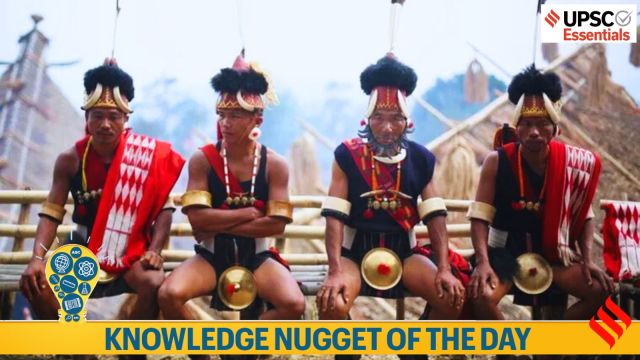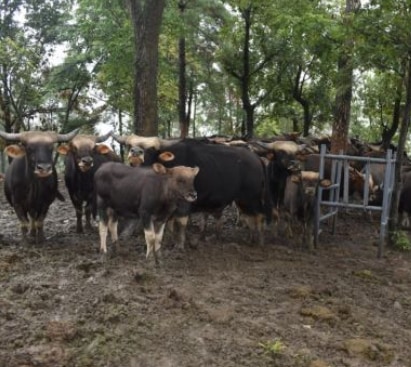Take a look at the essential events, concepts, terms, quotes, or phenomena every day and brush up your knowledge. Here’s your knowledge nugget for today.
Knowledge Nugget: Hornbill Festival
Subject: Art & Culture
(Relevance: Various festivals and tribes form an important part of Indian society. The festivals are also significant from the perspective of art and culture as they reflect the various aspects of any society. Thus, knowing about these festivals becomes important.)

Why in news?
The Nagaland government is all set to organise the popular Hornbill festival, which will take place from December 1 to December 10, 2024. Often referred to as the “Festival of Festivals,” the Hornbill Festival is one of the most iconic cultural events in Nagaland. It will be held at the Kisama Heritage Village, located just 12 kilometers from Kohima, the capital of Nagaland.
Key Takeaways :
1. Named after the revered Hornbill bird, the festival showcases the culture, heritage, food and customs of Naga tribes and people from these tribes come together to celebrate their traditions with colourful dance performances.
2. The annual programme brings all the 17 tribes of the state on a platform and facilitates promotion of their culture to the rest of the world.
3. The festival is vibrant and full of energy throughout the day, with warriors dressed in full ceremonial attire performing traditional dances and war cries. Each performance tells a story—of victories, harvests, love, and tribal legends. The warriors, adorned with distinctive headgear decorated with hornbill feathers, boar tusks, and colorful woven sashes, create an unforgettable spectacle.
Great Hornbill
1. The great hornbill is found in primary evergreen and moist deciduous forests, primarily inhabiting the canopy of tall trees.
Story continues below this ad
 Female Great Hornbill in Siolim (Photo credit: Stephen Menezes)
Female Great Hornbill in Siolim (Photo credit: Stephen Menezes)
2. It is classified as Vulnerable by the IUCN and is protected under Schedule I of the Wildlife Protection Act of 1972.
3. In India, Greater Hornbills are found in the Western Ghats and the Himalayas. It is the state bird of Arunachal Pradesh and Kerala.
4. Interestingly, India is home to nine hornbill species, with the northeastern region exhibiting the highest diversity of these species in the country.
BEYOND THE NUGGET: Nagaland- Tribes and Festivals
1. The State of Nagaland was officially inaugurated on December 1, 1963, becoming the 16th state of the Indian Union. It is bordered by Assam to the west, Myanmar (Burma) to the east, Arunachal Pradesh and part of Assam to the north, and Manipur to the south.
Story continues below this ad
2. The state bird of Nagaland is the Blyth’s tragopan. Mithun is the state animal of Nagaland and Arunachal Pradesh.
3. Nagaland comprises 16 administrative districts, which are home to 17 major tribes, along with several sub-tribes. Each tribe has its own unique customs, languages, and traditional attire, making them distinct from one another.
| Tribes of Nagaland |
| 1. Angami |
2. Ao |
3. Chakhesang |
4. Chang |
| 5. Khiamniungan |
6. Kuki |
7. Konyak |
8. Kachari |
| 9. Lotha |
10. Phom |
11. Pochury |
12. Rengma |
| 13. Sumi |
14. Sangtam |
15. Tikhir |
16. Yimkhiung |
| 17. Zeliang |
|
|
|
4. Some of the GI-tagged products of Nagaland are Naga tree tomato, Naga cucumber, and Naga Mircha.
Story continues below this ad
5. Protected Areas in Nagaland are: Intanki National Park, Fakim Wildlife Sanctuary, Singphan Wildlife Sanctuary, Pulie Badze Wildlife Sanctuary.
6. Nagaland is filled with festivals that reflect its rich culture. Each tribe celebrates its own unique festivals. Notably, over 85% of the population in Nagaland directly depends on agriculture; thus we see that most of these festivals centre around agriculture, which is the backbone of Naga society.
| Sl.No |
Tribe |
Festival |
Month |
| 1. |
Angami |
Sekrenyi |
25 February |
| Terhünyi |
9 December |
| 2. |
Ao |
Moatsu |
2 May |
| Tsungremmong |
1-2 August |
| 3. |
Chakhesang |
Sökrönye |
15 January |
| Tsukhenie |
24 April |
| 4. |
Chang |
Poang Lüm |
13 January |
| Kundaglün |
1 April |
| Naknyulüm |
31 July |
| 5. |
Khiamniungan |
Khaozaosie – Hok – Ah |
20 January |
| Biam |
7 August |
| Tsokum |
5 October |
| 6. |
Kuki |
Mimkut |
17 January |
| Chavang Kut |
1 November |
| 7. |
Konyak |
Aoleang |
1- 2 April |
| Lao – Ong Mo |
28 September |
| 8. |
Kachari |
Bishu |
27 January |
| 9. |
Lotha |
Tokhu Emong |
6 – 7Novemebr |
| 10. |
Phom |
Monyu |
1 – 2 April |
| 11. |
Pochury |
Yemshe |
5 October |
| 12. |
Rengma |
Ngada |
27 – 28 November |
| 13. |
Sumi |
Tuluni |
8 July |
| Apikimti |
4 – 5 November |
| Ahuna |
14 – 15 November |
| 14. |
Sangtam |
Tsohsu |
12 March |
| Hunapongpi |
18 August |
| Mongmong |
3 September |
| 15. |
Tikhir |
Kuhlang – Nyi |
18 January |
| Tsonglak-Nyi |
9 October |
| 16. |
Yimkhiung |
Wangtsunuo |
16 April |
| Metemneo |
8 August |
| 17. |
Zeliang |
Mileinyi |
11 March |
| Langsimnyi |
31 October |
(Sources: Hornbill Festival 2024, nagaland.gov.)
For your queries and suggestions write at roshni.yadav@indianexpress.com
Story continues below this ad
Subscribe to our UPSC newsletter and stay updated with the news cues from the past week.
Stay updated with the latest UPSC articles by joining our Telegram channel – Indian Express UPSC Hub, and follow us on Instagram and X.



 Female Great Hornbill in Siolim (Photo credit: Stephen Menezes)
Female Great Hornbill in Siolim (Photo credit: Stephen Menezes) At Thetsumi village in Nagaland. Mithuns are usually let loose in a community forest and have rarely required shelter or supplementary feeding, except for salt. (Image credit: ICAR)
At Thetsumi village in Nagaland. Mithuns are usually let loose in a community forest and have rarely required shelter or supplementary feeding, except for salt. (Image credit: ICAR)






























